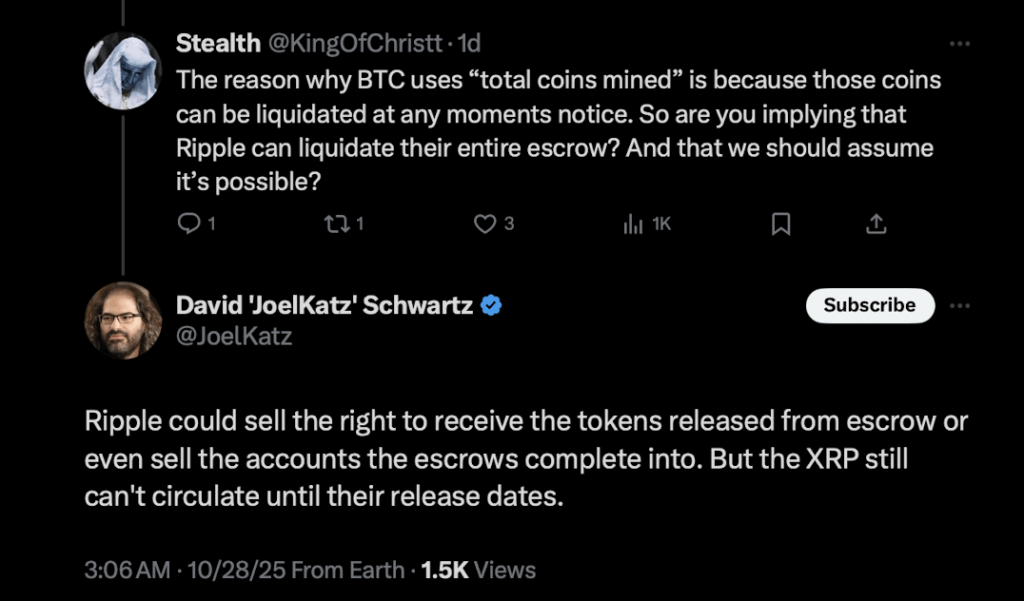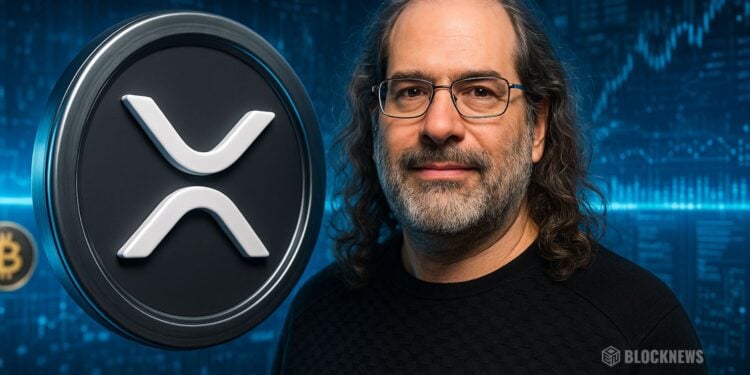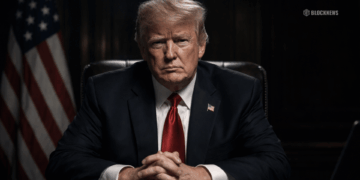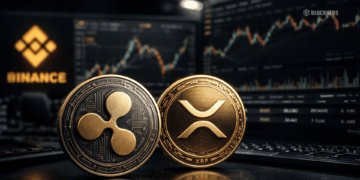- Ripple CTO David Schwartz confirms Ripple can sell rights to escrowed XRP but not access the tokens early.
- Ripple controls about 35B XRP in escrow, worth roughly $92B.
- The move renews speculation about institutional deals tied to Ripple’s future token releases.
Ripple’s Chief Technology Officer, David Schwartz, has cleared up one of the most debated questions in the XRP community — yes, Ripple can legally sell or transfer the rights to receive XRP that’s currently locked in its escrow accounts.
The clarification came after a community debate over how circulating supply is calculated for cryptocurrencies — specifically, why CoinMarketCap counts all Bitcoin, including coins likely lost forever in Satoshi Nakamoto’s wallets, but excludes Ripple’s escrowed XRP from circulation.
The Debate Over XRP’s True Circulating Supply
It all started when software engineer Vincent Van Code pointed out what he called a “double standard.” He argued that if CoinMarketCap excluded Satoshi’s presumed one million BTC, Bitcoin’s total market cap would drop by about 15%. In contrast, XRP’s market cap is currently calculated using about 60 billion tokens instead of its full 65 billion supply, putting its valuation near $157 billion at $2.62 per token — rather than the $170 billion it would show if all XRP were counted.
Others countered that Bitcoin’s numbers include every mined coin because technically, all of them could be moved or sold — even those sitting untouched for a decade. That raised an obvious question: could Ripple do the same with its escrowed XRP before the monthly unlocks take place?

Schwartz Explains Ripple’s Legal Flexibility
Schwartz stepped in to clarify the issue, confirming that Ripple can sell or transfer the contractual rights to future XRP locked in escrow — but the coins themselves can’t move until their release schedule allows. “We can assign or sell the rights to receive XRP, but those tokens still remain locked until they’re released,” he explained.
That means Ripple could theoretically sell the accounts or contracts tied to future escrow releases without changing the current circulating supply. It’s a rare look at how Ripple can legally structure deals involving its escrow holdings — and how it could, in theory, use those rights for financing or partnerships before the XRP is ever released.
What It Means for Market Transparency
According to public data from XRPScan, Ripple still holds around 35 billion XRP in escrow, worth roughly $92 billion. The existence of that massive pool has long fueled debate over Ripple’s control of XRP’s future liquidity — and whether such holdings give it an outsized influence over the market.
Schwartz’s comments have reignited speculation that Ripple might already have institutional agreements in place related to those escrowed assets. Some community members believe Ripple could be selling or assigning escrow rights to large financial institutions, while others think these rights could eventually support government reserves or large-scale enterprise partnerships.
Ripple’s Strategy and the Bigger Picture
This discussion comes on the heels of reports about Evernorth’s plan to acquire $1 billion worth of XRP to build a reserve system. Ripple publicly supported the idea but didn’t confirm whether the escrow funds would play a role in it. Analyst Nietzbux even suggested Ripple may have already sold portions of its escrow rights to institutional buyers, though Ripple has made no such announcement.
In the end, Schwartz’s clarification doesn’t change XRP’s supply math — but it does show that Ripple has significant legal room to maneuver financially without unlocking any XRP early. That flexibility could shape Ripple’s strategy going forward and might influence how investors interpret XRP’s market dynamics in the years to come.














